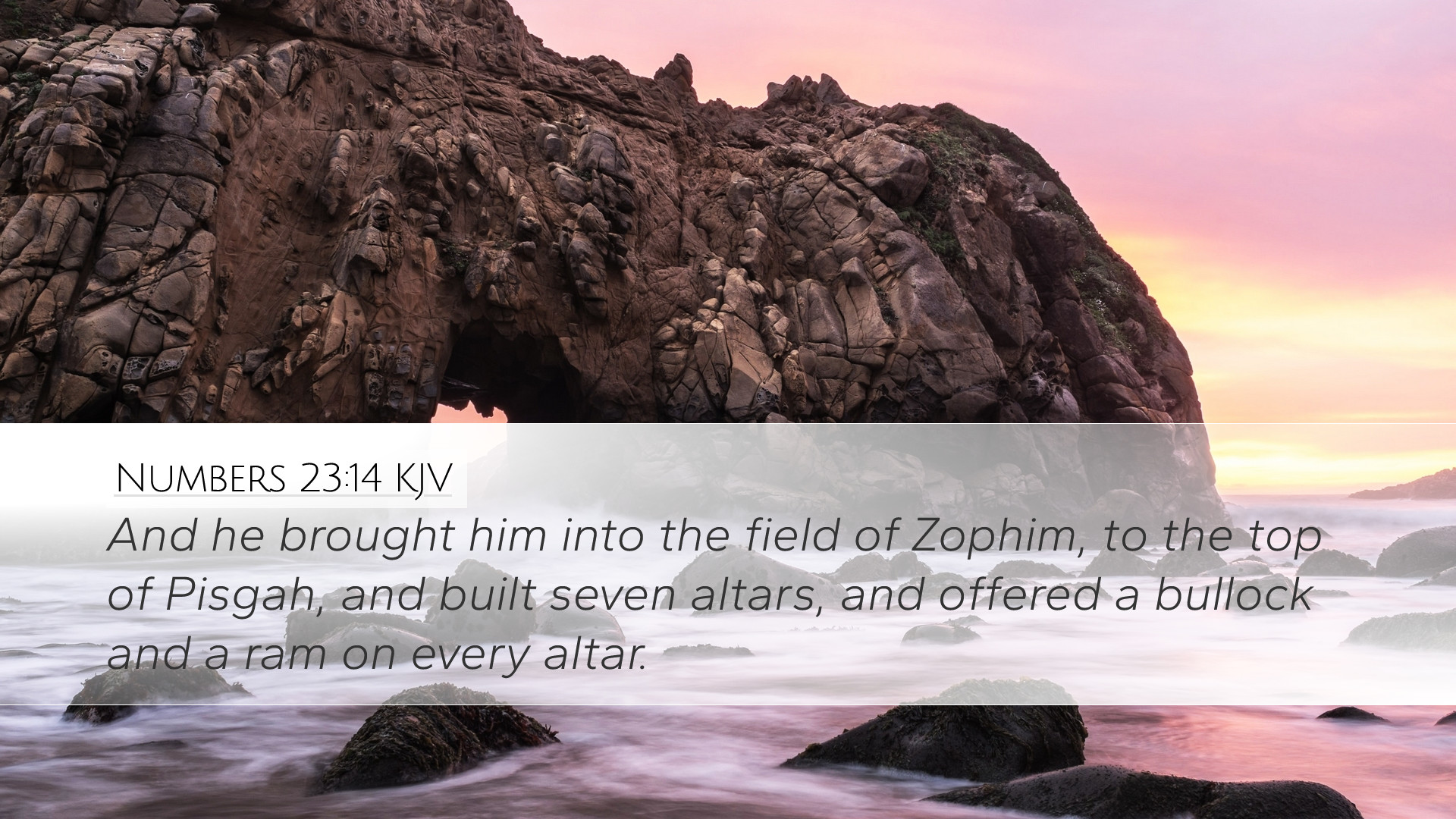Commentary on Numbers 23:14
Verse: “And he brought him to the field of Zophim, to the top of Pisgah, and built seven altars, and offered a bullock and a ram on the altar.”
Introduction
The passage of Numbers 23:14 is situated within the larger narrative of Balaam's attempts to curse the Israelites as instructed by Balak, the king of Moab. This moment marks a significant point in the unfolding of God's providential care for His people, revealing themes of divine sovereignty and prophetic authority.
Contextual Background
As we delve into this commentary, we must first consider the historical and theological context surrounding this verse. Israel, on the verge of entering the Promised Land, faces opposition from Moab. Balak enlisted the prophet Balaam, known for his ability to bless or curse, aiming to turn God's favor against Israel.
The choice of location—"the field of Zophim" and "the top of Pisgah"—is of utmost significance. Pisgah, a peak from which one could potentially observe the encampment of the Israelites, serves as an elevated point from which Balaam would attempt to invoke a curse.
Insights from Matthew Henry
Matthew Henry, in his commentary, brings forward the idea that Balaam's actions symbolize the futility of opposing God’s will. He observes that the construction of seven altars is not only a ritualistic act but also a profound display of Balaam's intention to negotiate with God. Henry notes that despite Balaam’s attempts to contrive a curse, God's purpose cannot be thwarted.
- Ritual Significance: Henry highlights that the seven altars might indicate a complete offering, representative of the fullness of Balaam’s intentions to seek favor with the divine (or influence the divine). This reflects the practice of the ancient Near Eastern cultic practices.
- Divine Sovereignty: He emphasizes that though Balaam prepares to curse, the meaning of God's protective covenant over Israel prevails. This demonstrates that God ultimately holds authority over all prophetic utterances.
Insights from Albert Barnes
Albert Barnes expands on the elements of worship and prophetic activity tied to this verse. He elucidates how Balaam's actions, despite their misguided intent, reflect a structured approach to seeking divine favor.
- Altars and Sacrifices: Barnes points out that the offering of a bullock and a ram on these altars was integral to ancient worship. This was a way to appease the divine with sacrificial offerings, signifying Balaam's commitment to the task assigned by Balak.
- Location Implications: The top of Pisgah is significant not only for the vantage point it provides but also for its spiritual implications. Barnes argues that lofty heights often symbolize encounters with God (similar to other Biblical narratives) and suggest the positioning of Balaam towards divine revelation.
Insights from Adam Clarke
Adam Clarke contributes to the discussion by providing context around Balaam’s character and motivations. Clarke notes that Balaam, although a prophet, serves as a complex figure—one who straddles the line between divine calling and personal ambition.
- Balaam's Intent: Clarke emphasizes that Balaam’s primary motivation is greed and personal gain. The seven altars and the significant offerings are reflective of a man trying to consolidate power through religious means.
- Understanding Prophecy: Clarke elucidates that Balaam's prophetic gifts do not inherently sanctify his actions. Despite being a prophet, his heart remained twisted by avarice, reminding readers that the gifts of God can be misused when not aligned with His purposes.
Theological Implications
This passage provides rich material for theological reflection. The attempt to curse Israel reveals the tension between divine sovereignty and human agency. The idolatrous practices of Balaam, reflected in his sacrificial offerings, serve as a contrast to the pure worship of Yahweh.
Practical Applications
For pastors and theologians, Numbers 23:14 underscores the importance of purity in worship and the prioritization of divine authority over human wisdom. It serves as a cautionary tale about the consequences of attempting to manipulate God for personal gain.
Conclusion
In summary, Numbers 23:14 reveals profound truths about human attempts to navigate divine will. The importance of primary submission to God’s sovereignty stands at the forefront. Reflecting on the insights from Henry, Barnes, and Clarke, we are reminded that while human actions may attempt to contravene God's plans, ultimately, His purposes prevail—bringing comfort and inspiration to believers as they navigate their journeys of faith.


